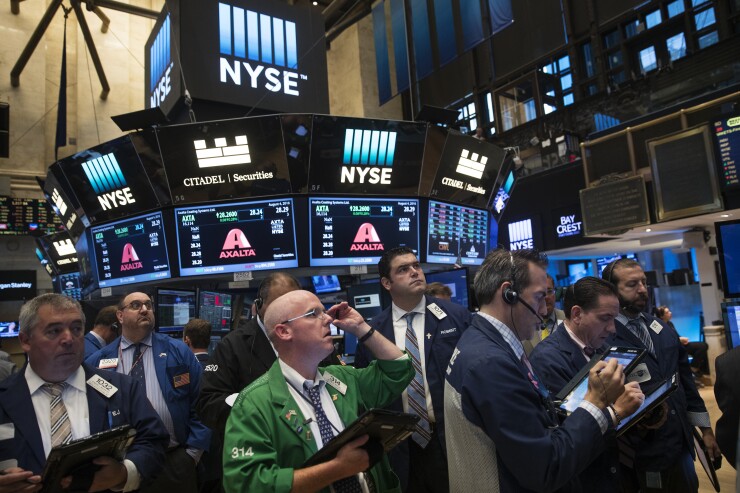The Dow's first record close in three months comes amid a market drawing increasingly bright lines between what it views as winners and losers in a Donald Trump presidency.
Consider that the 30-stock gauge’s 218-point ascent Thursday happened the same day the Nasdaq 100 Index dropped the most since September, their biggest divergence since the Internet bubble burst. Weakness in technology stocks and a handful of defensive industries that soared in the first half held the S&P 500’s gain to roughly a fifth of the Dow’s.
The surge in stocks following a presidential election echoed 1996 and 1972, when the blue-chip index made fresh highs just after victories by Bill Clinton and Richard Nixon.
On the upside were financial shares, perceived beneficiaries should Trump make good on threats to dismantle the Dodd-Frank Act, as well as industrial and materials stocks in anticipation of infrastructure spending. Along with technology shares, pain was felt in high-dividend industries such as household product makers, utilities and phone companies as bond yields surged.

“People are going through the possibilities about what Washington looks like today and what Washington can do or not do for them,” said John Manley, who helps oversee about $233 billion as chief equity strategist for Wells Fargo Funds Management in New York. “Corporations feel there’s a less restrictive hand. People may take that as a positive. It’s the end of the uncertainty.”
The Dow rose 218.19 points, or 1.2%, to 18,807.88, topping its Aug. 15 record. Meanwhile, the Nasdaq 100 lost 1.6%. The S&P 500 advanced 0.2% and the small-cap Russell 2000 jumped 1.6% and is up 4.7% since Trump’s election.
Amazon.com fell 3.8% to lead the rout in technology. JPMorganChase jumped 4.6% and Goldman Sachs climbed 4.3%
The financial and health care industries have surged since Trump’s surprise win on Tuesday, rallying on expectations that the president-elect and Republican-controlled Congress will roll back regulations. Trump’s promise to revive American infrastructure means commodities used to build everything from airports to bridges will benefit under his presidency, according to Goldman Sachs.
“Yields are moving their way higher, that’s good for banks,” said Art Hogan, chief market strategist and director of research for Wunderlich Securities in Boston. “If there’s going to be a friendlier regulatory environment that’s going to be good for banks. That’s the tailwind behind financials we haven’t seen for a long time.”
While opinions vary about what’s behind the tech rout, one possibility was concern about the impact of Trump’s policies on trade overseas, where U.S. technology companies thrive. Others saw a rational retreat for a group that through Election Day had surged 11% in 2016, or even the potential for retaliation by the president-elect against an industry that didn’t exactly cozy up to him during the campaign.
Department-store stocks rallied. Kohl’s jumped 12% after saying back-to-school sales were strong. Macy’s surged 5.6% after hiring Brookfield Asset Management to squeeze more money out of its real estate holdings.
In the 22 elections going back to 1928, the S&P 500 has fallen 15 times the day after polls close, for an average loss of 1.8%. Stocks reversed course and moved higher over the next 12 months in nine of those instances, according to data compiled by Bloomberg.





